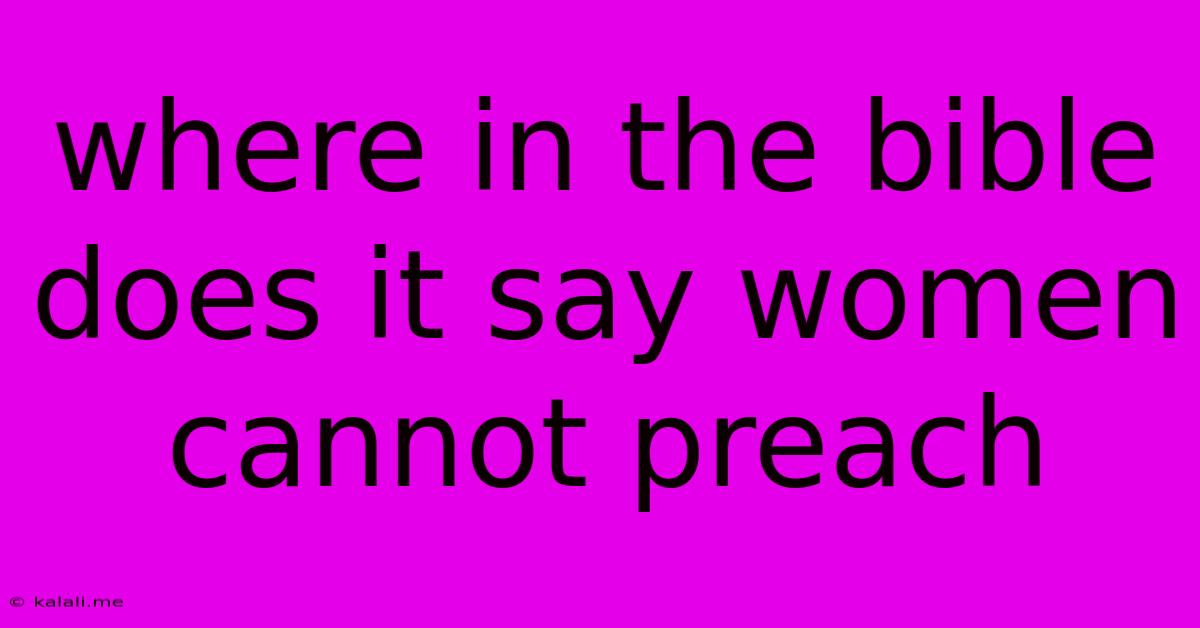Where In The Bible Does It Say Women Cannot Preach
Kalali
Jun 04, 2025 · 3 min read

Table of Contents
Where in the Bible Does it Say Women Cannot Preach? A Critical Examination
The question of whether the Bible forbids women from preaching is a complex one, sparking considerable debate among Christians. Many point to specific passages as evidence, while others argue that these passages are misinterpreted or taken out of context. This article explores the key biblical texts often cited in this discussion and offers a balanced perspective. The debate is not merely academic; it impacts the practical roles and participation of women in churches worldwide.
Key Passages and Interpretations:
Several passages are frequently cited to support the view that women should not preach or hold positions of authority within the church. However, interpretations vary significantly.
1 Corinthians 14:34-35:
This passage is perhaps the most frequently quoted: "Let your women keep silence in the churches: for it is not permitted unto them to speak; but they are commanded to be under obedience, as also saith the law. And if they will learn any thing, let them ask their husbands at home: for it is a shame for women to speak in the church." (KJV)
Critical Analysis: The interpretation of this passage is highly contested. Some argue it reflects the cultural norms of first-century Corinth, a city known for its social unrest and gender inequality. Others argue that Paul's instruction is specific to the disorderly nature of the Corinthian church and doesn't apply universally to all times and contexts. Furthermore, the meaning of "speak" is debated; does it refer to all forms of speaking, or specifically to interrupting or disrupting the church service?
1 Timothy 2:11-15:
"Let the woman learn in quietness with all subjection. But I suffer not a woman to teach, nor to usurp authority over the man, but to be in silence." (KJV)
Critical Analysis: Similar to 1 Corinthians 14, the context and meaning of "teach" are debated. Some interpret this as forbidding women from teaching men in matters of faith, while others argue against any form of public teaching by women. The cultural context of the time, and the potential for misinterpretation given the power dynamics of that era, are crucial factors in understanding this passage. The verses that follow discuss Eve's deception and the role of women in bearing children, linking these to the teaching on women's roles. Some see this as establishing a hierarchical structure, while others argue that it should not be taken out of context from the overall message of salvation and redemption found throughout the Bible.
Other Passages and Counterarguments:
While the above are the most frequently cited passages, proponents of women's preaching often point to other biblical examples that suggest otherwise:
- Deborah, a Judge and Prophetess: Deborah led Israel militarily and prophetically, a clear leadership role not often associated with women in some interpretations.
- Priscilla and Aquila: These early Christians were active in ministry and theology, teaching Apollos (Acts 18:26). The fact that Priscilla is mentioned before Aquila suggests she was influential in their theological discussions and teaching, challenging traditional hierarchical views.
- Women as Evangelists: The New Testament records numerous women who were involved in spreading the Gospel, such as the women who followed Jesus and those mentioned in Romans 16.
These examples, and others, are used to argue that while certain passages may be interpreted as restricting women's roles, the overall biblical narrative supports a wider range of involvement for women in ministry and leadership, including preaching.
Conclusion:
The question of whether the Bible forbids women from preaching remains a matter of ongoing theological discussion and interpretation. The passages often cited against it are open to different understandings, significantly influenced by historical and cultural context. Understanding the nuances of these texts requires careful consideration of the original language, historical setting, and the broader biblical narrative. The ultimate interpretation is a matter of conscience and theological conviction. However, a nuanced and balanced examination of the scriptural evidence reveals that there's no single, definitive answer, making the debate a vital one within Christian communities.
Latest Posts
Latest Posts
-
Is The X In X Ray Capitalized
Jun 06, 2025
-
Why Did Boggs Give The Holo To Katniss
Jun 06, 2025
-
How Long Can Fish Sit Out
Jun 06, 2025
-
Civ 6 Kill A Unit With A Quadreme
Jun 06, 2025
-
Cloak Of The Manta Ray 5e
Jun 06, 2025
Related Post
Thank you for visiting our website which covers about Where In The Bible Does It Say Women Cannot Preach . We hope the information provided has been useful to you. Feel free to contact us if you have any questions or need further assistance. See you next time and don't miss to bookmark.